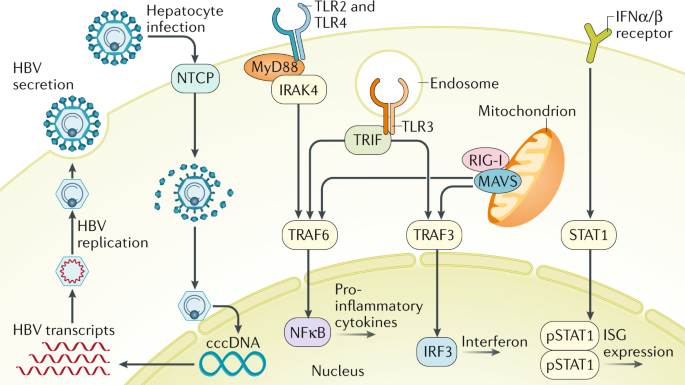
- Select a language for the TTS:
- UK English Female
- UK English Male
- US English Female
- US English Male
- Australian Female
- Australian Male
- Language selected: (auto detect) - EN
Play all audios:
HBV and HCV infections continue to be major global health problems, causing over 1 million deaths annually. Key studies this year investigated the innate and adaptive immune responses in
different clinical scenarios in HBV infection, whereas others evaluated the merits of transplanting HCV-infected organs into uninfected recipients. KEY ADVANCES * HBV is able to act as a
‘stealth virus’ and evade the innate immune response1,2,3. * Factors associated with hepatitis flares after stopping antiviral therapy could eventually serve as biomarkers to predict who can
safely stop treatment5,6. * Transmission of HCV can occur through liver transplantation despite absence of measurable viraemia in HCV-antibody positive donors, highlighting the need for
close follow-up of patients receiving these organs7. * Organ transplantation from HCV-infected donors to HCV-uninfected recipients is safe but early and possibly even pre-emptive treatment
is important to reduce the risk of relapse or severe initial infection8,9. Access through your institution Buy or subscribe This is a preview of subscription content, access via your
institution ACCESS OPTIONS Access through your institution Access Nature and 54 other Nature Portfolio journals Get Nature+, our best-value online-access subscription $32.99 / 30 days cancel
any time Learn more Subscribe to this journal Receive 12 print issues and online access $209.00 per year only $17.42 per issue Learn more Buy this article * Purchase on SpringerLink *
Instant access to full article PDF Buy now Prices may be subject to local taxes which are calculated during checkout ADDITIONAL ACCESS OPTIONS: * Log in * Learn about institutional
subscriptions * Read our FAQs * Contact customer support REFERENCES * Suslov, A. et al. Hepatitis B virus does not interfere with innate immune responses in the human liver.
_Gastroenterology_ 154, 1778–1790 (2018). Article CAS Google Scholar * Mutz, P. et al. HBV bypasses the innate immune response and does not protect HCV from antiviral activity of
interferon. _Gastroenterology_ 154, 1791–1804 (2018). Article Google Scholar * Ortega-Prieto, A. M. et al. 3D microfluidic liver cultures as a physiological preclinical tool for hepatitis
B virus infection. _Nat. Commun._ 9, 682 (2018). Article CAS Google Scholar * Berg, T. et al. Long-term response after stopping tenofovir disoproxil fumarate in non-cirrhotic
HBeAg-negative patients — FINITE study. _J. Hepatol._ 67, 918–924 (2017). Article CAS Google Scholar * Rivino, L. et al. Hepatitis B virus-specific T cells associate with viral control
upon nucleos(t)ide-analogue therapy discontinuation. _J. Clin. Invest._ 128, 668–681 (2018). Article Google Scholar * Rinker, F. et al. Hepatitis B virus-specific T cell responses after
stopping nucleos(t)ide analogue therapy in HBeAg-negative chronic hepatitis B. _J. Hepatol._ 69, 584–593 (2018). Article CAS Google Scholar * Bari, K. et al. Hepatitis C transmission from
seropositive, nonviremic donors to non-hepatitis C liver transplant recipients. _Hepatology_ 67, 1673–1682 (2018). Article CAS Google Scholar * Reese, P. P. et al. Twelve-month outcomes
after transplant of hepatitis C-infected kidneys into uninfected recipients: a single-group trial. _Ann. Intern. Med._ 169, 273–281 (2018). Article Google Scholar * Durand, C. M. et al.
Direct-acting antiviral prophylaxis in kidney transplantation from hepatitis C virus-infected donors to noninfected recipients: an open-label nonrandomized trial. _Ann. Intern. Med._ 168,
533–540 (2018). Article Google Scholar * Levitsky, J. et al. The American Society of Transplantation Consensus Conference on the use of hepatitis C viremic donors in solid organ
transplantation. _Am. J. Transplant._ 17, 2790–2802 (2017). Article CAS Google Scholar Download references AUTHOR INFORMATION AUTHORS AND AFFILIATIONS * Toronto Centre for Liver Disease,
Toronto General Hospital Research Institute, University Health Network, Toronto, Canada Jordan J. Feld & Adam J. Gehring * Institute for Medical Science, University of Toronto, Toronto,
Canada Jordan J. Feld & Adam J. Gehring * Department of Immunology, University of Toronto, Toronto, Canada Adam J. Gehring Authors * Jordan J. Feld View author publications You can also
search for this author inPubMed Google Scholar * Adam J. Gehring View author publications You can also search for this author inPubMed Google Scholar CORRESPONDING AUTHOR Correspondence to
Jordan J. Feld. ETHICS DECLARATIONS COMPETING INTERESTS J.J.F. has received research support from Abbvie, Gilead, Janssen and Merck and honoraria for scientific consulting from Contravir,
Enanta and Roche. A.J.G. has acted as a consultant for Aicuris, Arbutus, Roche and SpringBank Pharmaceuticals and has received research funding from Janssen & Gilead. RIGHTS AND
PERMISSIONS Reprints and permissions ABOUT THIS ARTICLE CITE THIS ARTICLE Feld, J.J., Gehring, A.J. Host–pathogen interactions in chronic HBV infection and transplantation of HCV-positive
organs. _Nat Rev Gastroenterol Hepatol_ 16, 77–78 (2019). https://doi.org/10.1038/s41575-018-0101-y Download citation * Published: 07 January 2019 * Issue Date: February 2019 * DOI:
https://doi.org/10.1038/s41575-018-0101-y SHARE THIS ARTICLE Anyone you share the following link with will be able to read this content: Get shareable link Sorry, a shareable link is not
currently available for this article. Copy to clipboard Provided by the Springer Nature SharedIt content-sharing initiative






